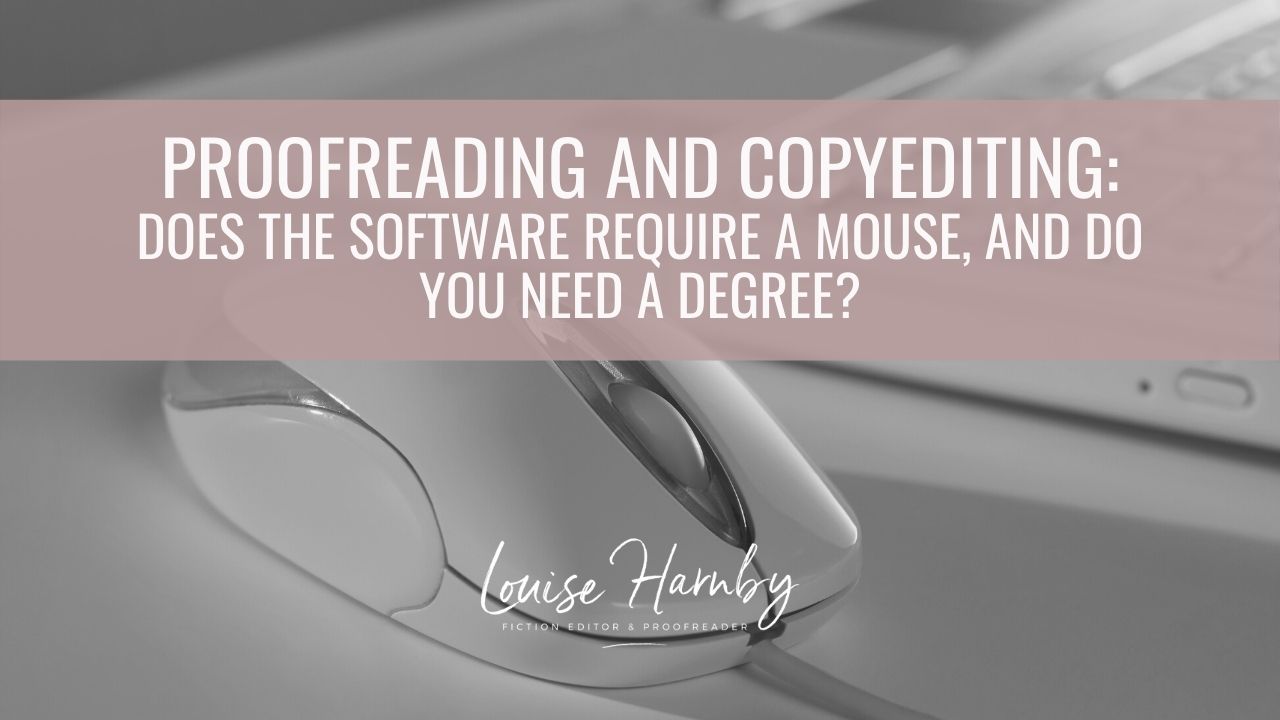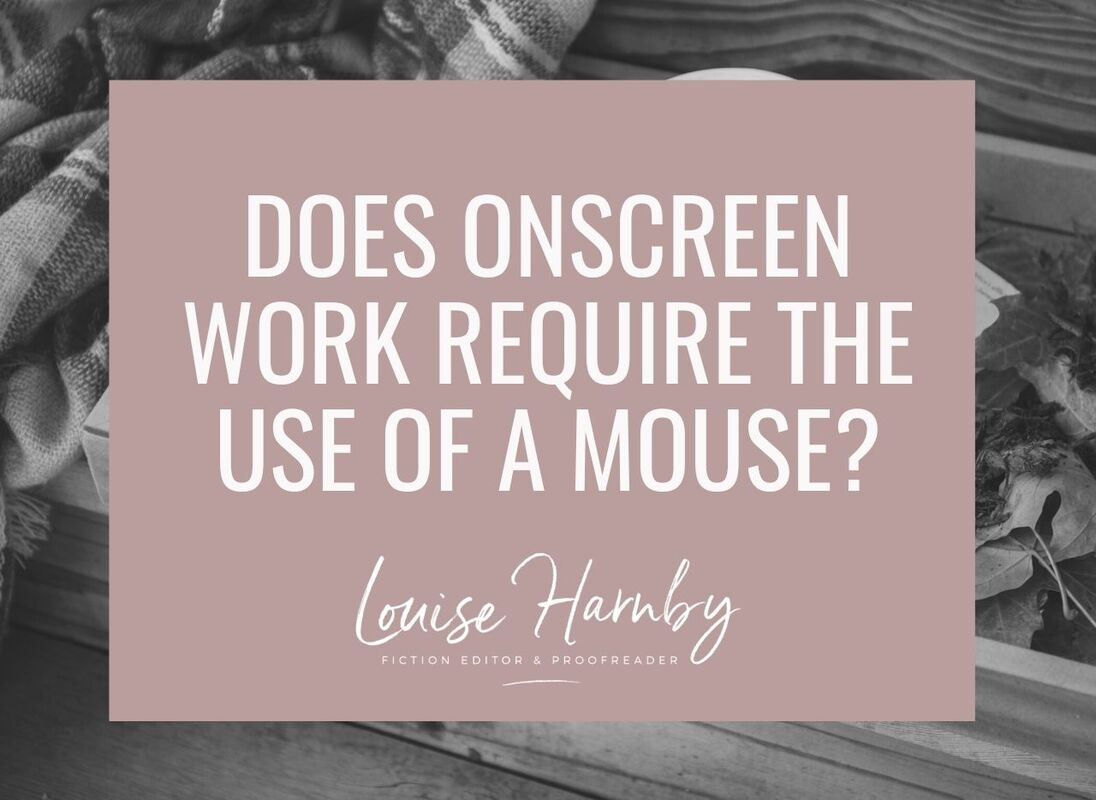|
Can you proofread and copyedit professionally without being mouse-dependent? And what if you don't have a degree? Does it matter? A reader asked me. Here's my take.
Andrew says:
I am considering taking introductory courses in proofreading and copyediting; firstly, please could I ask you about the software used. Usually I prefer to use the keyboard to move around the menus, because I find repeatedly using a mouse tiring on my hands and arms. Does (at least some of) the software used in your industry allow keyboard use as an alternative to mouse work? Secondly, would my lack of a degree hold me back? I have many years' experience in IT system development and programming; would this experience be attractive to publishers? However, I was hoping to not just to work on IT-related material! Thanks for your question, Andrew. Let’s deal with the software issue first. Software Text editing When editing raw text, most editors use Microsoft Word. There are several excellent complementary add-on programs. These increase the editor’s productivity because they allow us to do complex tasks more quickly. One example is PerfectIt, an outstanding consistency checker that can be customized to find and fix problems including hyphenation, capitalization, spelling variance, number style, italics, super/subscript, bullet punctuation, and wildcard searches. In addition, there are hundreds of free macros available to editors, all of which are designed to complement the editor’s eye. Examples include spell-checkers, proper-noun analysis tools, homonym and homophone identifiers, Then there are onboard tools in Word such as wildcard search and find/replace to name but two. And let’s not forget Word’s ribbon, which provides quick access to a range of tools, including the Styles palette. To work efficiently, you’ll need to access these tools. As long as you know (or can learn) how to access the relevant menus via your keyboard, and assign keyboard shortcuts, I see no reason why you should be dependent on a mouse. Page-proof annotation If you’re hired to proofread designed page proofs, you’ll likely be working on PDF in Acrobat Pro, PDF-XChange, Adobe Reader or similar. You’ll need to be able to use the onboard comment-and-markup tools and possibly the stamps palette. Again, providing you can learn the keyboard shortcuts, you can minimize your mouse usage. There’s a helpful list of Acrobat shortcuts on the Adobe website: A note of caution: my concern is the impact on your speed. One of the keys to being a successful independent editor is efficiency. If you’re already a seasoned mouse-independent Word and Acrobat user, and are introducing new keyboard shortcuts into your existing knowledge base, I suspect the transition will be comfortable and the impact on your speed minimal. If you’re not familiar with these programs, the tools within them, and the access keys, you’ll need practice to build your speed. In general, though, given your extensive experience in systems development and programming, I can’t see these issues being obstacles for you, Andrew. You’ve probably forgotten more about how to navigate a computer screen than I’ve ever known! Is a degree necessary? If you want to copyedit for specialist scientific editing agencies, you’ll likely need at least a Master’s in a related discipline, even a doctorate. If you plan to work for publishers or packagers (project-management agencies) with book lists in the social sciences, arts, humanities and technology, they’ll be more interested in your professional editorial training, and your ability to perform successfully in an editorial assessment. If you wish to copyedit and proofread reports, books, journal articles, theses and dissertations for self-publishers, businesses, academics and students, focus on what you can do to solve their problems. These days, I work exclusively for self-publishing fiction writers. They’re preparing their novels for a crowded market full of discerning readers with the ability to leave critical reviews on Amazon. My job is to help them overcome some of the problems they’ll encounter on that journey, and my website focuses on that rather than on my politics degree. Did my politics degree help me when I worked exclusively for social science publishers? Perhaps. But I think my years of in-house publishing experience, marketing social science journals, helped more. When some years later I was proofreading a book for a well-known university press and Loïc Wacquant came up in the references but the diacritic in his first name had been omitted, I spotted it. It was my career experience that showed me the way, not my degree. You, too, can use your IT background to demonstrate your knowledge and experience to clients. But it will only be part of the story. Ultimately, your message will need to be about them – their problems, their concerns, their challenges … and how you are part of the solution. If you tell that story in a compelling way, you’ll build a brand identity that inspires trust and engagement, one that makes you stand out against your competitors, regardless what subject you didn’t read at university. And though you don’t want to work exclusively on IT-related material, don’t shy away from using that as your springboard. It’s what you know, what makes you special. No one’s going to hire me to edit an IT book. Why would they when they can hire someone who speaks the language and knows the subject like the back of his hand – someone like you? Specialize in what you know first. Diversify as the opportunities arise, and develop your brand identity as required. That way you’re playing to your strengths in the start-up phase. I hope that helps you on your journey. Good luck!
Louise Harnby is a line editor, copyeditor and proofreader who specializes in working with crime, mystery, suspense and thriller writers.
She is an Advanced Professional Member of the Chartered Institute of Editing and Proofreading (CIEP), a member of ACES, a Partner Member of The Alliance of Independent Authors (ALLi), and co-hosts The Editing Podcast. Visit her business website at Louise Harnby | Fiction Editor & Proofreader, say hello on Twitter at @LouiseHarnby, connect via Facebook and LinkedIn, and check out her books and courses.
1 Comment
1/10/2017 05:05:39 pm
Good questions from Andrew, and the answers were great.
Reply
Leave a Reply. |
BLOG ALERTSIf you'd like me to email you when a new blog post is available, sign up for blog alerts!
TESTIMONIALSDare Rogers'Louise uses her expertise to hone a story until it's razor sharp, while still allowing the author’s voice to remain dominant.'Jeff Carson'I wholeheartedly recommend her services ... Just don’t hire her when I need her.'J B Turner'Sincere thanks for a beautiful and elegant piece of work. First class.'Ayshe Gemedzhy'What makes her stand out and shine is her ability to immerse herself in your story.'Salt Publishing'A million thanks – your mark-up is perfect, as always.'CATEGORIES
All
ARCHIVES
July 2024
|
|
|
|

















 RSS Feed
RSS Feed





